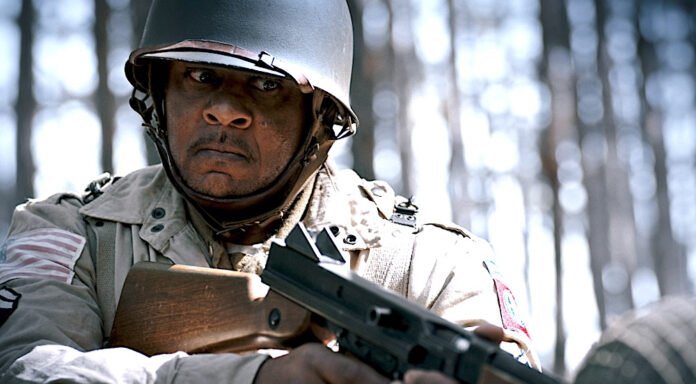The Game alum Pooch Hall left the football field behind and is now behind enemy lines in his new film Murder Company. He plays an American soldier assigned to eliminate a Nazi enemy target on D-Day. “Playing Coolidge where I got to represent Black fighters in World War II working alongside White soldiers, and not looking at it as a race thing, but as a brotherhood, that was really special,” he shares about the film, which is inspired by real-life events.
A big proponent of mental health, Hall got to explore the mental state of Black men fighting during World War II and their unwavering resilience. Here with EBONY, the actor reflects on the importance of mental wellness for every Black man, including his late father, who passed in June 2024.
EBONY: Your new film is inspired by historical events. What drew you to this piece?
Pooch Hall: The story played a major part in our history. One of the things about World War II is how Black people were treated. We weren’t allowed to fight in the beginning. Our film’s director, Shane Dax Taylor—a good friend of mine—said that we’re telling the history of this motley crew misfit bunch that came together for the greater good. When Black people joined the fight, we were like, “Use us.” That is why we joined the military, not just to clean barracks, play baseball or be mechanics. We had some skills that we needed to add. The enemy was Adolf Hitler, a racist, so why not put our differences aside and come together to fight that evil?

What was it like to wear a U.S. military uniform from a past era?
I don’t want to undermine the real heroes, the men and women who are actually fighting for our country and for our freedom; my hat goes off to them. Our director wanted authenticity for the film, so we had to wear an authentic uniform. Every time we got dressed in World War II gear, we must have lost like 20 lbs. because we sweated. We shot in Bulgaria, and it could be cold, wet and humid, or it was hot as hell. And the clothes didn’t really breathe, so your mind clicked into survival mode. But as soon as you hear “action” and the explosions, you’re in it. I think that realness will come through.
Black men’s mental health is an important topic for you. What do you think was the mental state of the Black men fighting back in World War II?
Mental health is major, especially for Black men. We have to be able to identify that it’s okay to not be okay. When you are ridiculed and persecuted throughout your whole life and finally get accepted into the war but still can’t express yourself through combat, the psychological gymnastics at play to finally get equality and an opportunity, you have to have a strong mindset just overcome. One of the things about mental health, even in today’s society, is that you gotta pay attention to your feelings. You have to embrace them. And I think they had to confide in each other. You gotta commend these soldiers for having the mindset of a strong individual, the ones who made it through. Being ridiculed and being persecuted isn’t new to me. To overcome that and then go to war and want to fight speaks volumes. My heart was pumping and racing during filming, and this is a movie. So imagine the mental state of the people who really did it.
Mental health and wellness hasn’t always been a right given to Black men.
I never saw my dad cry; he held all that in. Black men who are trying to survive and get through it think they can’t show weakness. We always have to be on point. But where’s space for those other emotions when you’re not feeling okay, you’re afraid, or you’re just not having a good day? Therapy was offered to my dad, but he was like, “I’m not gonna to therapy. What’s someone gonna tell me?” It’s not about that. It’s about getting the help and tools to deal with certain emotions that you may not have mastered or understand. Shout out to the people who are getting into therapy because when you don’t have that outlet or feel like someone doesn’t understand you, you can keep it bottled up to where you explode.
What advice would you give to Black men, in the military and out, about the importance of mental wellness?
I’ve lost some friends who came back from Iraq and were struggling, but they felt like they had no help. That’s something to pay attention to. I commend all the soldiers fighting for our country, as well as police officers and others who help people stay safe. Make sure you pay attention to those emotional feelings that may get you down or something that might’ve been
traumatic. Get that help. Talk to someone.



